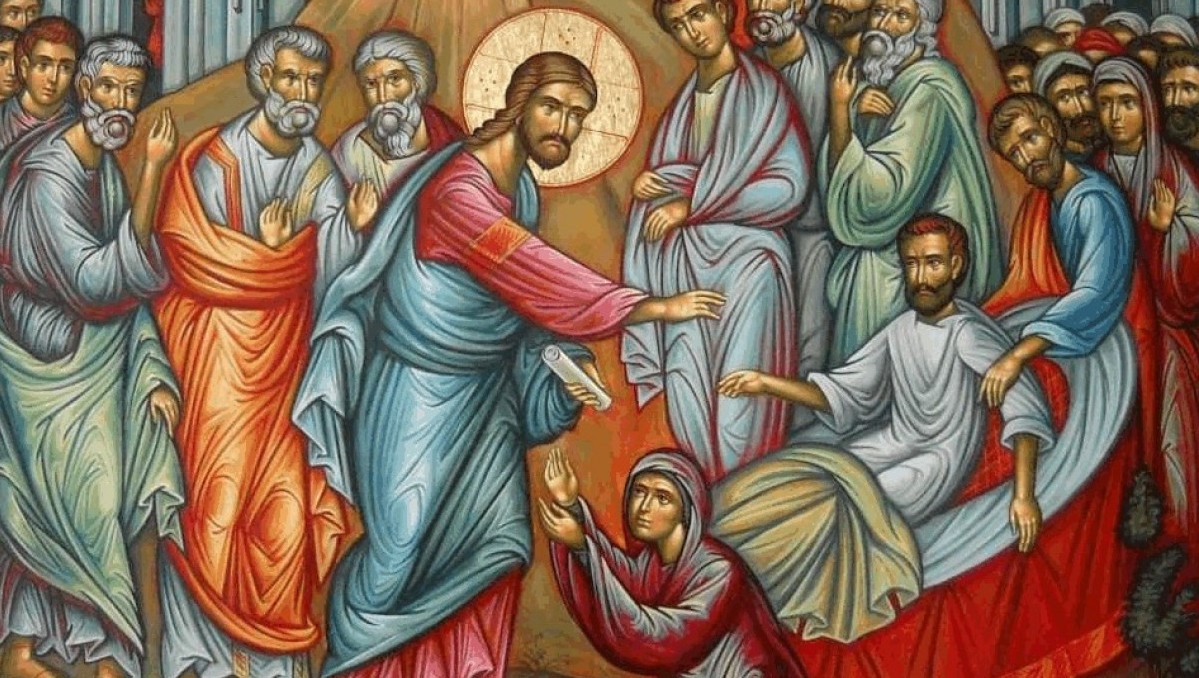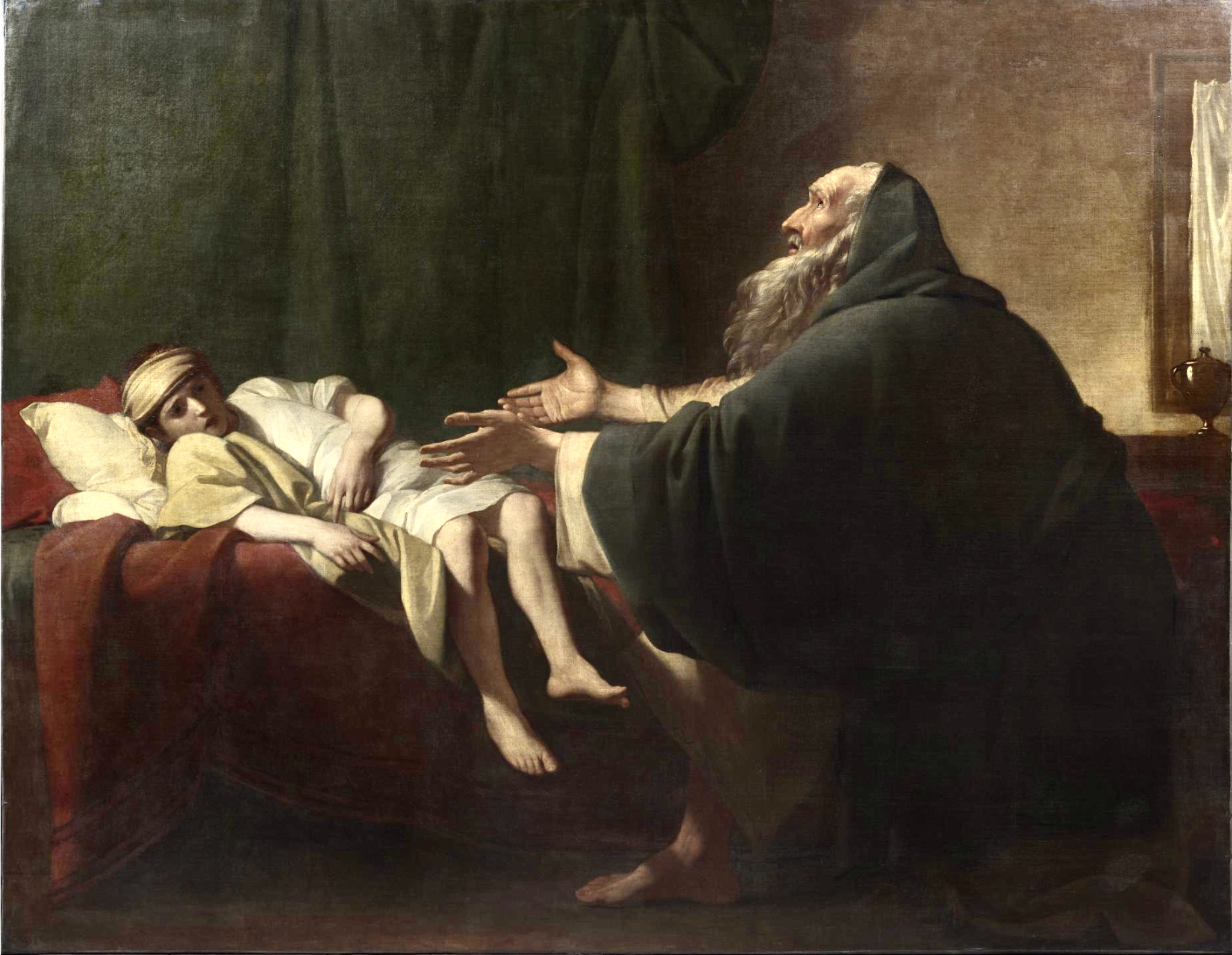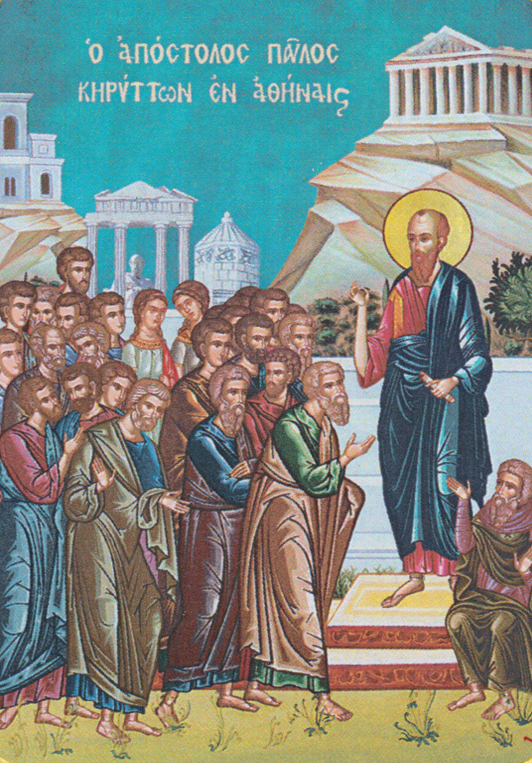
John 20:1-10 (Matins)
2 Corinthians 9:6-11
Luke 7:11-16
The Lord of Life
.... and they glorified God, saying, "A great prophet has risen up among us"; and, "God has visited His people."
(Lu 7:16)
In the Name of the Father and of the Son and of the Holy Ghost. Amen.
The ministry of Jesus of Nazareth is about
eternal life
and
eternal death.
We hear of unquenchable fire and of the Bosom of Abraham,
of harsh final judgments and of the Kingdom of Heaven,
of death unto death,
experienced by the impenitent thief,
and of life unto life,
experienced by the contrite thief.
The question is always,
"Which is the life that blesses the world around it?"
and
"Which is the life that curses the world around it?"
Always this question.
This morning we consider the only son of a widow.
For the ancient world this was a vivid example of life redeeming life.
And it is one of the golden threads running through the Holy Scriptures
leading up to the life that will bless and redeem the world.
The Book of Ruth was written perhaps six centuries before St. Luke's Gospel.
It tells the story of a woman, Naomi, living in Moab at the turn of the Bronze Age to Iron Age.
Her husband and sons have died.
The story is simple but not intelligible to us until we understand
that
a widow without sons in the ancient world was the face of the blasted and the lost.
In our own time,
have you seen this face in our inner cities?
Property rights for women were uncertain in ancient times.
The status of women as heirs of property are not outlined in the Book of Numbers.
Naomi would not have been able to fend for herself.
She was in a foreign country without male extended-family to protect her.
She lived in Moab, which was an antagonist to Israel.
Certainly, she would have been the target of exploitation
if not
rape and then murder.
Until we comprehend all of this,
then we cannot appreciate the magnitude of sacrifice offered to her by her daughter-in-law Ruth,
who, herself being childless, still had a chance of finding a husband,
and
by that fact,
the doorway into a new life.
Yet,
Ruth gives all that up agreeing to face a cruel world and probably die along side Naomi.
Here is the life that blesses.

The story of Naomi and Ruth would have formed the backdrop for Elijah
raising the only son of a widow from Zarephath from the dead,
a story
found in 1 Kings.
In this case,
both widow and son are on the point of death,
following a prolonged drought and famine.
In this case, the widow owns her house,
yet the death of an only son, following the loss of her husband, would have been catastrophic.
We hear Elijah crying out in the room where the dead son lay:
|
"Lord my God, have you brought tragedy even on this widow I am staying with,
by causing her son to die?" Then he stretched himself out on the boy three
times and cried out to the Lord, "Lord my God, let this boy's life return to him!"
(1 Kings 17:20-21)
|
The restoration of the son's life means resurrection for his mother, as well.
Both deaths of widow's only sons,
in Moab and in Zarephath,
would have been the background story
for Elisha raising the only son of a widow of Shunem from the dead,
found in 2 Kings 4.
Child mortality would have been high.
Birth was a risky proposition for both newborn and mother.
Following birth, life expectancy has been shown to be twenty-three years
according to
one recent study
of an Iron Age settlement in the Mediterranean region.
Death in itself was common during the Iron Age.
It is the death of a widow's only son, though, that is our subject this morning.
You see, this was a category of tragedy during the age of Naomi, Elijah, and Elisha
—
not death per se,
but the horrible
loss of a widow's only son.
It would be better for such a woman to die.
No one hearing the story of the widow of Nain in St. Luke's Gospel
would have missed this connection.
The woman of Nain also has no husband.
She also now follows a funeral procession to the grave of her only son.
Jesus steps forward to comfort her,
following in the footsteps of Ruth,
who was King David's great-grandmother
and
therefore a linear ancestor of Jesus.
Like Ruth He comforts and relieves suffering ....
but
with one very great difference:
he restores her life by raising her only son from the dead:
Then He came and touched the open coffin, and those who carried him stood still.
And He said, "Young man, I say to you, arise." So he who was dead sat up and
began to speak. And He presented him to his mother.
(Mt 16:18)
|
This is the gift of life.
☦
The death of children was common during the Iron Age
or
Roman
Antiquity,
and,
by the canons of the Holy Scriptures,
we cannot say that raising children from the dead was unknown.
How many people did Jesus raise from the dead?
There is the resurrection we have just witnessed.
Then there is the raising of Jairus' daughter.
Finally,
there is the dramatic resurrection of Lazarus,
who had been dead several days
and
whose body had "begun to stinketh."
Before these resurrections,
in addition to the resurrections performed by Elijah and Elisha,
an Israelite soldier had been laid in a tomb next to Elisha,
but when the corpse touched the prophet's bones, he returned to life
(2 Kings 13:20-21).
All of this is to say,
that the resurrection from the dead is not the singular event
that many Christians make it out to be.
We cannot say that it is garden variety.
After all, the Sadducees rejected these reports as "fairy tales."
On the other hand,
we cannot say that it is singular either.
Both St. Peter and St. Paul raise people from the dead
during
the early years of the Church.
"Tabitha! Arise!"
The epigram with which we began
—
"A great prophet has risen up among us."
—
arises from a fact:
that raising the dead is something one might
expect of a prophet.
If Jesus' resurrection is not the great singularity of the Bible,
then,
what is it about Jesus that is one-of-a-kind?
Astonishing?
Marvelous?
It is life,
the life that blesses.
The life of Jesus,
which we call His Incarnation,
is the great singularity of human history.
Returning to our epigram:
|
"God has visited His people"
|
but not in the sense of messenger in the form of a prophet,
but God Himself has visited His people.
That is the singularity represented by the Name, Jesus.
All the Scriptures before His birth look forward to this great event,
and
all the Scriptures following look back upon it.
His life
is the great event of the ages of ages.
What, then, had happened
to reverse this great truth?
What happened to turn this great burst of light into a cult of death?
We hear in our own time, for example, that
"Jesus has died for my sins"
or that
"He has nailed my debt to the Cross"
or that
Jesus must be sacrificed on a High Altar as the climax of the Roman Catholic Mass.

By contrast to all of these things,
the Apostle Paul stood at ancient world's center of thought,
Athens,
and summed up the Christian faith in his great "Sermon on the Areopagus" (Acts 17:16-34):
|
The God Who created all things has drawn near with His lifegiving Kingdom.
He does not receive sacrifices, for all things are already His.
All humankind are family, proceeding from one blood according to His plan.
We are His offspring; therefore Divinity is not found in idols but in ourselves.
He is near to each of us, yet He has set within us a desire to seek Him.
We fell into a deep sleep of ignorance forgetting Him and the interior temple.
He has set a time when we must give an account of this neglect and unworthy living.
He has sent His Son to show us what we were made to be and how we must live.
This Son has pioneered the path through death to eternal life and to Heaven.
|
Yes, St. Paul does say,
|
"[God] has given assurance of this to all by raising Him from the dead."
|
but in passing.
This is not the great event.
The body of his sermon is occupied with Divine life.
And let us pause to think about this:
exactly what, short of overcoming death, could demonstrate the
power of Divine life?
We must not fail to mention that Jesus' path through the world
is one from which disease and death shrink.
He is surrounded by multitudes longing for this property of His Person.
He is the Lord of Life!
His path through the human lifeworld
is one where things come rapidly into bloom
and
from which pestilence cringes in horror.
A wonderful painting pointing back to a first-century tradition
depicts the Flight to Egypt.
In the midground of the canvas, the Holy Family makes their lowly and humble way through
the wilderness.
But in the foreground the figure of a pagan god standing on a pillar shatters
from the mere fact of Jesus' life passing by .... passively.
The demons cry out in terror,
"Son of David, Son of God, what have You to do with us?!"
Do you see?
It is His Divine life we want to pay attention to,
not merely one of its properties,
which is its
indifference to disease and death on earth.
We are
all of one blood,
and
we are offspring of
this life.
Life from life!
And it is the business our life to
to lay claim to this royal birthright as householders of Heaven.
These are the major points that St. Paul makes ....
not
"Let us sacrifice Jesus to God, so that we can have eternal life!"
This grotesque statement would have been unintelligible and alien!
Tragically
and
to the detriment of many souls,
we are heirs to a most disfiguring theological innovation.
During the eleventh century a fad of Italian Roman Catholic theology
held that Jesus was born to be offered as a sacrifice to appease an angry Father God.
Then much later,
the Protestant Reformers
fastened on to this innovation and developed elaborate theologies around it
ignoring
the integrity of the Christian faith.
Do you hear what I am saying?
The eleventh century!
A thousand years after the birth of Jesus!
This is not one set of theological opinions set against another
during the time of Jesus .... but rather a thousand years later .... and in Italy.
Then,
throw another five hundred years in to get to the Protestant Reformers .... this brings
us nearly to the modern period!
The
Fathers taught
that Jesus' Incarnation renewed the world and
redeemed humanity
whether or not He went to the Cross.
The point of the Cross is that
for even the indifferent and dull-witted,
for even those who did not have eyes to see
nor
ears to hear,
even
they might understand this:
that Jesus is
the Son of God,
the Victor over death,
the Almighty and Everlasting Lord.
No one fails to get it after the stone is burst off the mouth of the tomb!
But were not all these things true of Him before Calvary?
Were they not true at His birth, throughout His luminous life,
and before all worlds .... and unto the ages of ages?!
It has always been true.
It always will be true.
We do not need the Cross to make it so.
Today,
we are presented with a Gospel lesson that points us away from the cult of death.
Today,
we behold Jesus in the fullness of His true Identity:
the greatest Life that blesses,
the Lord of Life,
even
the Eternal Word of Creation.
The power the flows from His hand is that power
which shall ever elude frail humanity:
it is that magic,
that stirring,
that animate life,
which we shall never have the capacity to create.
We can only wonder why we do not have the capacity to reverence it.
So let us be content
that we do have the capacity to marvel,
to appreciate,
and
to hold the high honor to reverence that which God Alone can be and do,
opening to us
the door to our everlasting happiness.
This morning let us give thanks for the life that blesses.
And
let us always flee the ideas and people that curse.
In the Name of the Father and the Son and the Holy Spirit.
Amen.


